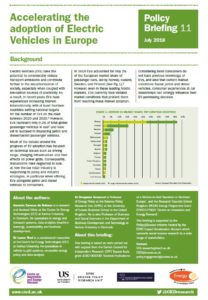 This policy brief sets out how car automotive dealerships, the automotive industry and policy makers can help speed up the spread of Electric Vehicles (EVs).
This policy brief sets out how car automotive dealerships, the automotive industry and policy makers can help speed up the spread of Electric Vehicles (EVs).
Research by the Centre on Innovation and Energy Demand (CIED) and Aarhus University has found that car dealerships and sales personnel actively discourage customers from selecting an EV. The study identified nine distinct barriers within car dealerships, including sales personnel being primarily dismissive of EVs as a purchasing option, misinforming customers on EVs specifications and tax schemes, and neglecting to include EVs within the sales conversation.
EVs have the potential to considerably reduce transport emissions and contribute further to the decarbonisation of society, especially when coupled with low-carbon sources of electricity. As a result, in recent years EVs have experienced increasing interest internationally, with at least fourteen countries setting national targets for the number of EVs on the road between 2020 and 2030. However,EVs represent only 0.2% of total global passenger vehicles in use and have yet to succeed in displacing petrol and diesel-fuelled passenger vehicles.
In 2018 EVs accounted for only 2% of the European market share of passenger cars, led by Norway, Iceland, Sweden, and Finland (See Fig 1). However, even in these leading Nordic markets, EVs currently face variable market conditions that prevent them from reaching mass market adoption. Considering most consumers do not have previous knowledge of EVs, and also that current market conditions favour petrol and diesel vehicles, consumer experiences at car dealerships can strongly influence their EV purchasing decision.
Read the policy brief.
Find out more about our work on Transport.